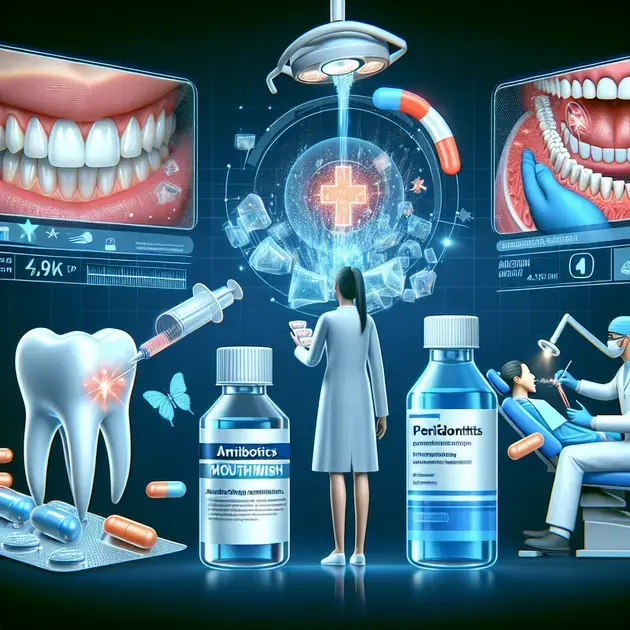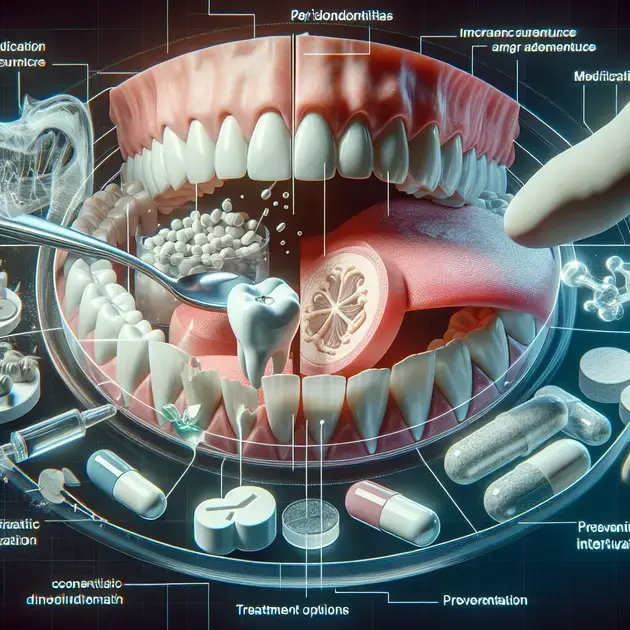Are you searching for effective medication for periodontitis? Look no further. This comprehensive guide will provide you with all the information you need to understand and treat this common dental problem.
Periodontitis can have serious consequences if left untreated, including tooth loss and other systemic health issues. By following the recommendations in this guide, you can take proactive steps towards managing and improving your oral health.

Understanding Periodontitis Treatment Options
Periodontitis treatment options can vary depending on the severity of the condition. It is important to consult with a dentist or periodontist to determine the best course of action for your specific case. Here is a step-by-step guide to understanding periodontitis treatment options:
1. Consultation with a Dental Professional
The first step in exploring periodontitis treatment options is to schedule a consultation with a dental professional. They will assess the condition of your gums and teeth, possibly using tools like X-rays to get a clearer picture of the extent of the periodontal disease.
2. Scaling and Root Planing
One common non-surgical treatment for periodontitis is scaling and root planing. This deep cleaning procedure removes bacteria and tartar from the surfaces of the teeth and the roots. It helps promote gum healing and prevent further progression of the disease.
3. Antibiotics
In some cases, antibiotics may be prescribed to help control the bacterial infection causing periodontitis. These antibiotics can be in the form of pills, mouth rinses, or gels applied directly to the gums.
4. Periodontal Surgery
In more severe cases of periodontitis, surgical intervention may be necessary. Procedures like flap surgery, bone grafts, or tissue regeneration can help restore the damaged gums and supporting structures around the teeth.
5. Ongoing Maintenance
Regardless of the treatment option chosen, ongoing maintenance and regular dental visits are crucial to managing periodontitis. Good oral hygiene practices, such as brushing and flossing regularly, can help prevent the recurrence of the condition.
The Importance of Early Intervention
Early intervention in cases of periodontitis is essential for preventing further damage to the gums and teeth. Here are some key reasons why early intervention is important:
1. Preventing Tooth Loss
By addressing periodontitis early on, the progression of the disease can be halted, reducing the risk of tooth loss. Early treatment can help preserve the supporting structures of the teeth and prevent the need for extractions.
2. Avoiding Pain and Discomfort
Untreated periodontitis can lead to complications such as gum abscesses, gum recession, and tooth sensitivity. Early intervention can help alleviate pain and discomfort associated with these symptoms.
3. Cost-Effective Treatment
Early intervention is not only beneficial for your oral health but can also be more cost-effective in the long run. Treating periodontitis at an early stage may require less extensive and costly procedures compared to advanced cases.
4. Improving Overall Health
Periodontitis has been linked to various systemic health conditions, including heart disease, diabetes, and respiratory infections. Early intervention can help reduce the risk of these complications and promote overall health and well-being.
5. Preserving Gum and Bone Tissues
Early treatment of periodontitis can help preserve the gum and bone tissues that support the teeth. This can prevent irreversible damage and maintain the structural integrity of the mouth.
Tips for Preventing Periodontitis
Preventing periodontitis involves adopting a proactive approach to oral hygiene and overall health. Here are some tips to help prevent the onset of periodontal disease:
1. Brush and Floss Regularly
Regular brushing and flossing are essential to remove plaque buildup and prevent gum disease. Use a soft-bristled toothbrush and fluoride toothpaste, and don’t forget to clean between your teeth with floss or interdental brushes.
2. Visit Your Dentist Regularly
Schedule regular dental check-ups and cleanings to detect any signs of gum disease early on. Your dentist can provide personalized advice on maintaining good oral health and recommend appropriate treatments if needed.
3. Maintain a Healthy Diet
Eating a balanced diet rich in vitamins and minerals can support gum health and overall well-being. Limit sugary and acidic foods that can contribute to tooth decay and gum inflammation.
4. Avoid Smoking and Tobacco Use
Smoking and tobacco use are significant risk factors for periodontal disease. Quitting smoking can improve gum health and reduce the likelihood of developing periodontitis.
5. Manage Stress
Chronic stress can weaken the immune system and make you more susceptible to gum infections. Practice stress-reducing techniques like meditation, yoga, or deep breathing exercises to maintain overall health.

**
Effective Medication Options for Managing Periodontitis
**
Periodontitis is a serious gum infection that damages the soft tissue and destroys the bone that supports your teeth. It is crucial to effectively manage periodontitis to prevent further damage and maintain oral health. When it comes to medication options for managing periodontitis, there are several effective treatments available.
One common medication option is antibiotics, which can help control the bacterial infection causing periodontitis. Antibiotics may be prescribed in various forms, such as pills, mouth rinses, or gels. These medications work to eliminate the harmful bacteria in the gums and promote healing.
Another effective medication option is antimicrobial mouthwashes. These mouthwashes contain active ingredients that can help reduce plaque and prevent the growth of bacteria in the mouth. Using an antimicrobial mouthwash as part of your oral care routine can aid in managing periodontitis and maintaining a healthy mouth.
In some cases, your dentist may recommend prescription-strength fluoride toothpaste to help strengthen tooth enamel and prevent tooth decay. Fluoride toothpaste can also help reduce sensitivity and protect against further gum disease issues.
Surgical treatments, such as flap surgery or bone grafts, may also be necessary in advanced cases of periodontitis. These procedures, combined with effective medication options, can help manage periodontitis and improve oral health outcomes.
**
Importance of Timely Treatment for Periodontitis
**
Timely treatment for periodontitis is essential in preventing the progression of the disease and avoiding complications. Without prompt intervention, periodontitis can lead to tooth loss, bone damage, and systemic health issues. Understanding the importance of timely treatment can help individuals prioritize their oral health.
Early detection of periodontitis through regular dental check-ups is key to receiving timely treatment. Dentists can assess the state of your gums, identify any signs of gum disease, and recommend appropriate treatment options to address the issue before it worsens.
Delaying treatment for periodontitis can result in irreversible damage to the gums and supporting structures of the teeth. As the infection spreads, the risk of tooth mobility and eventual tooth loss increases, impacting your overall oral health and quality of life.
By seeking timely treatment for periodontitis, individuals can prevent the need for more extensive and costly interventions in the future. Addressing gum disease early on allows for more conservative treatment approaches and better outcomes in the long run.
Overall, recognizing the importance of timely treatment for periodontitis empowers individuals to take proactive steps towards maintaining their oral health and preserving their natural teeth. Early intervention can make a significant difference in managing periodontitis effectively.
**
Preventive Strategies for Periodontitis Recurrence
**
After undergoing treatment for periodontitis, it is crucial to implement preventive strategies to reduce the risk of recurrence and maintain gum health. Preventing the recurrence of periodontitis requires a combination of good oral hygiene practices, lifestyle modifications, and regular dental care.
Brushing your teeth at least twice a day and flossing daily can help remove plaque and bacteria from the gums, preventing the buildup of tartar and reducing the risk of gum disease. Using an antimicrobial mouthwash as recommended by your dentist can further enhance your oral hygiene routine.
Avoiding tobacco products is essential in preventing periodontitis recurrence, as smoking can impair gum healing and increase the risk of gum disease progression. Maintaining a healthy diet rich in fruits, vegetables, and lean proteins can also support gum health and overall oral health.
Scheduling regular dental cleanings and check-ups is vital for monitoring your gum health and addressing any early signs of gum disease. Your dentist can provide personalized recommendations for preventive care based on your individual oral health needs and risk factors.
Engaging in preventive strategies for periodontitis recurrence can help preserve the results of your treatment and minimize the likelihood of experiencing gum disease again. By incorporating these preventive measures into your daily routine, you can safeguard your gum health and maintain a beautiful smile for years to come.
Conclusion
In conclusion, effective medication options play a crucial role in managing periodontitis and preserving oral health. Antibiotics, antimicrobial mouthwashes, and prescription-strength fluoride toothpaste are valuable tools in combating the bacterial infection, reducing plaque, and strengthening tooth enamel. Surgical treatments like flap surgery or bone grafts may be necessary for advanced cases, working alongside medications to improve oral health outcomes.
Understanding the importance of timely treatment for periodontitis is paramount in preventing disease progression and complications such as tooth loss and bone damage. Early detection through regular dental check-ups allows for prompt intervention, avoiding irreversible damage to the gums and supporting structures. Timely treatment not only safeguards oral health but also prevents the need for costly interventions in the future.
Furthermore, implementing preventive strategies post-treatment is essential in reducing the risk of periodontitis recurrence. Good oral hygiene practices, avoidance of tobacco products, a healthy diet, and regular dental care are key factors in maintaining gum health. By incorporating these preventive measures into daily routines, individuals can preserve treatment results, minimize the likelihood of gum disease recurrence, and enjoy a beautiful smile for years to come.



